Uncover the entwined destinies of Perez and Zerah, twins whose birth foretells a legacy of conflict and prophecy in biblical history.

Perez and Zerah in the Bible
When you explore the story of Perez and Zerah in the book of Genesis, you're not just uncovering a tale of birth; you're stepping into a narrative rich with themes of conflict, prophecy, and legacy.
Their story begins with Tamar's audacious act, a moment that sets the stage for the unexpected birth of twins, where Perez's breach birth prefigures his role in the biblical lineage.
As you consider the implications of Perez's legacy and Zerah's unique mark on history, you're left to ponder how their narratives intertwine with the broader tapestry of biblical stories and what lessons they hold for contemporary discussions on faith, determinism, and redemption.
Key Takeaways
- The birth of Perez and Zerah highlights the significance of birth order and divine intervention in biblical narratives.
- Tamar's bold actions were pivotal in fulfilling prophecies and challenging societal norms, influencing Perez and Zerah's legacy.
- Their story underscores the impact of twin dynamics, divine favor, and unexpected outcomes on lineage and destiny.
- Perez and Zerah's lineage connects directly to King David and Jesus Christ, embodying divine grace and messianic fulfillment.
The Genesis of Conflict

While exploring the genesis of conflict between Perez and Zerah, it's essential to recognize that their rivalry was rooted in the circumstances of their birth, a pivotal moment that set the stage for future interactions. You'll find that this early event isn't just a tale of two brothers but a reflection of deeper family dynamics and ancestral decisions that resonate through their lineage.
The narrative, steeped in ancient culture and beliefs, underscores the importance of birth order in determining status and inheritance. The struggle between Perez and Zerah, beginning even before they were born, symbolizes the complexities of familial relationships and the often unpredictable consequences of ancestral choices. It's as if from their first moments, they were ensnared in a web spun by decisions made long before their time.
This rivalry, while personal, also mirrors the broader theme of conflict and competition within families, a motif that recurs throughout biblical stories. It prompts you to ponder the extent to which family dynamics and ancestral decisions shape individual destinies. The actions of their predecessors, laden with moral and ethical implications, cast long shadows over Perez and Zerah, influencing their paths in ways that are both visible and insidious.
Understanding this context is crucial for grasping the depth of their conflict. It wasn't merely a dispute between siblings; it was the culmination of a complex interplay of familial loyalty, societal expectations, and the enduring impact of past actions. This story invites you to reflect on the intricate ways in which family dynamics and ancestral decisions forge the identities and fates of individuals, setting the stage for both conflict and resolution.
Tamar's Courageous Act
Exploring the genesis of conflict between Perez and Zerah naturally leads us to consider Tamar's courageous act, a pivotal moment that reshaped their story and underscored the strength often found in the most desperate of circumstances. Tamar's experience highlights the complexities surrounding women's roles and societal norms in biblical times.
In your journey through this narrative, you'll uncover how Tamar, faced with widowhood and the denial of her rights by Judah, her father-in-law, took matters into her own hands. Her actions challenge the societal norms of her time, showcasing a profound level of agency and cunning. She disguises herself, securing her lineage through Judah, which not only ensures her survival but also cements her place in the lineage of notable biblical figures.
This act of bravery isn't just a tale of personal survival; it's a critique of the societal constraints placed on women. Tamar's story is a testament to the vital roles women played, often in the shadows, to shape their destinies within a patriarchal framework. Her resolve and strategic thinking challenge the status quo, prompting a reevaluation of women's roles in biblical narratives and their contributions to pivotal moments in history.
Analyzing Tamar's act through a scholarly and reverent lens, you'll appreciate the layers of complexity in her story. It's a narrative that not only questions societal norms but also celebrates the courage and ingenuity of women who, against all odds, assert their place and influence the course of history. Tamar's story is an early testament to the strength and resilience of women navigating a world that often sought to limit their agency.
A Prophecy Fulfilled
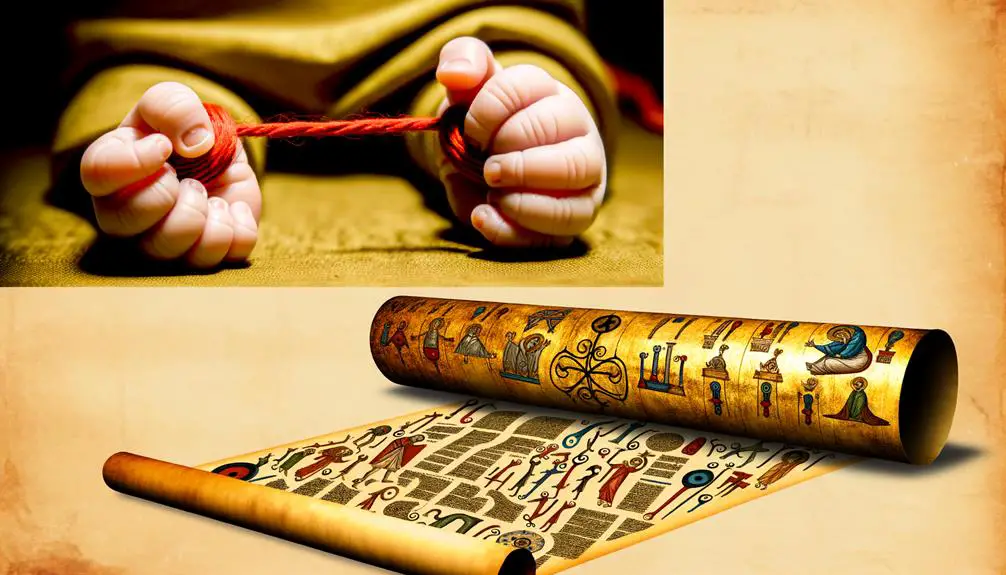
In the unfolding narrative of Perez and Zerah, Tamar's audacious act becomes the catalyst for a prophecy's realization, deeply intertwining her story with the broader tapestry of biblical destinies. You witness a remarkable instance of Divine intervention, setting the stage for profound Messianic foreshadowing. This moment isn't merely about the immediate resolution of a familial crisis; it transcends to embody the intricate ways through which the Divine shapes history.
Tamar's resolve and the subsequent birth of Perez and Zerah underscore a pivotal theme in biblical narratives: the unexpected ways through which Divine purposes are fulfilled. This narrative arc isn't just a personal story of vindication but a significant beacon of hope, illustrating how from seemingly bleak circumstances, the seeds of redemption are sown. Here are three key aspects that highlight the fulfillment of prophecy:
- Divine Intervention: The circumstances leading to the birth of Perez and Zerah showcase a direct involvement of the Divine in human affairs, orchestrating events beyond human foresight.
- Messianic Foreshadowing: Perez's lineage is critically important, serving as a direct ancestor to King David and, subsequently, to the Messiah. This lineage underscores the notion that even in moments of personal despair, the broader Divine plan is at work.
- Unexpected Instruments: Tamar, through her boldness, becomes an unlikely instrument in the Divine scheme, proving that the fulfillment of prophecies often involves surprising choices and events.
Analyzing this segment of the biblical narrative, you grasp the complexity of Divine intervention and Messianic foreshadowing, revealing a tapestry where every thread serves a higher purpose, meticulously woven by the Divine.
The Birth of Twins
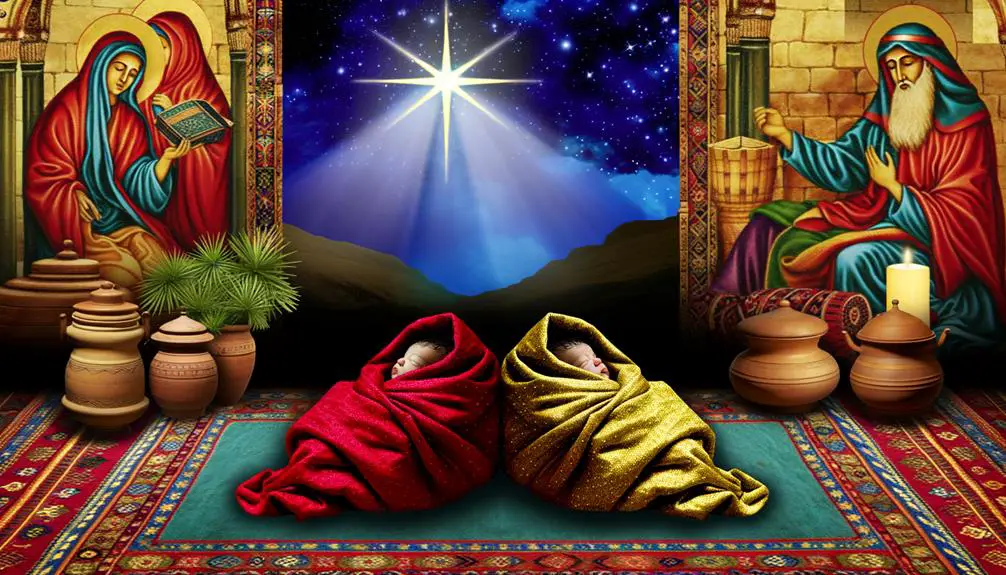
Having considered the profound implications of prophecy in the narrative of Perez and Zerah, let's now turn our attention to the moment of their birth, a pivotal event that further cements the Divine's intricate orchestration of history. This moment isn't merely the arrival of twins; it's a profound demonstration of the complexities of twin dynamics and the significance of birth order in biblical narratives.
As you delve into the story, you observe that the birth of Perez and Zerah is enveloped in unexpected occurrences and divine intervention. The narrative intricately weaves the anticipation of birth order, traditionally a determinant of blessing and lineage, with an unforeseen twist. This twist not only challenges the conventional expectations of primogeniture but also highlights the sovereign plans of the Divine beyond human understanding.
The engagement with twin dynamics here is particularly fascinating. The struggle within the womb and the surprising turn of events during their birth serve as a metaphor for broader themes of conflict, destiny, and divine favor. It's a clear illustration that the plans of the Divine aren't bound by human conventions of order and precedence.
Moreover, the birth of Perez and Zerah becomes a critical juncture in understanding how birth order influences destiny within the biblical narrative. It challenges you to reflect on the ways in which divine providence can overturn societal norms and expectations, making it evident that God's purposes transcend human schemes.
In essence, the birth of these twins isn't just a historical footnote. It's a richly layered episode that invites contemplation on divine sovereignty, the nuances of twin dynamics, and the pivotal role of birth order in shaping destiny as per the biblical worldview.
Perez's Legacy
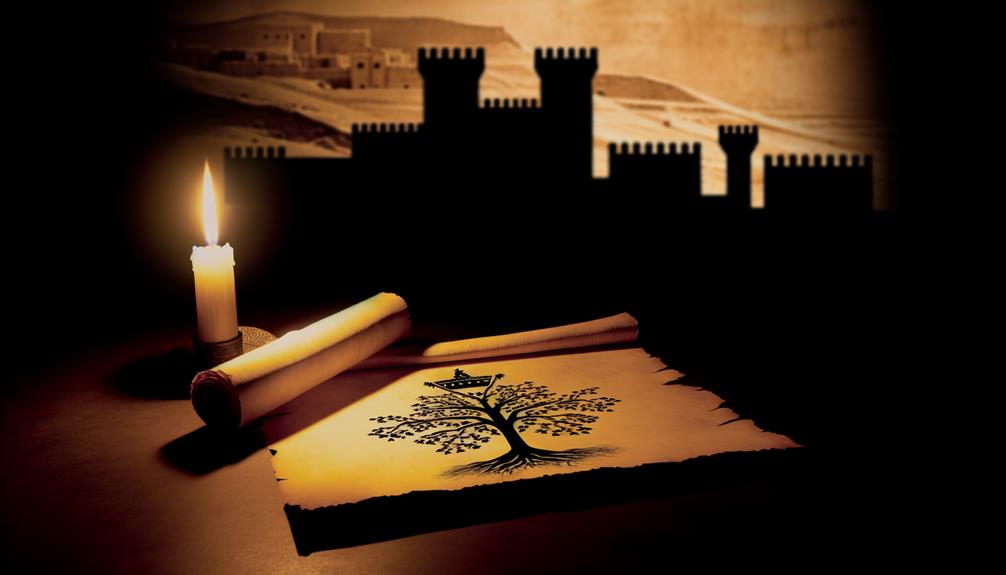
Perez's legacy, deeply embedded within the fabric of biblical history, showcases the profound impact of divine favor on lineage and destiny. As you delve into the genealogical records and narratives of the Bible, you'll uncover that Perez's descendants played pivotal roles in shaping the course of biblical events, culminating in a royal lineage that has fascinated scholars and believers alike.
The significance of Perez's lineage is highlighted through:
- The Establishment of a Royal Dynasty: Perez is an ancestor of King David, a central figure whose reign represents a golden era in Jewish history. This lineage not only underscores the fulfillment of divine promises but also the importance of Perez's descendants in the establishment of a royal dynasty that's revered to this day.
- The Presence in the Genealogy of Jesus: In the New Testament, Perez is mentioned in the genealogy of Jesus Christ, illustrating the continuity of God's plan through generations. This inclusion signifies Perez's essential role in the lineage leading to the Messiah, emphasizing the spiritual and historical importance of his legacy.
- The Symbolic Representation of Divine Favor: Perez's emergence as the firstborn, despite not being the first to breach the womb, symbolizes unexpected divine favor. This theme recurs throughout biblical narratives, with Perez's lineage serving as a testament to the idea that divine choice often defies human expectations.
In analyzing Perez's legacy, it's evident that his descendants were instrumental in the unfolding of biblical history. Their roles in establishing a royal lineage and fulfilling divine promises highlight the lasting impact of Perez's lineage on the biblical narrative and its theological implications.
Zerah's Mark
Zerah's legacy, though less prominent than his brother Perez's, holds its own unique significance in biblical narratives, revealing the intricate tapestry of divine purpose and human agency. His story, intertwined with symbolic gestures and acts, invites you to delve into the depths of Zerah's symbolism, unearthing layers of meaning that have shaped cultural interpretations over centuries.
You'll discover that Zerah's mark in the Bible isn't just a footnote but a reflection of the complexities of birthright, destiny, and divine intervention. His attempt to be the firstborn, marked by the scarlet thread, speaks volumes about the struggle for identity and blessing within a family dynamic teeming with prophetic undertones. This act, seemingly minor, encapsulates the tension between human actions and divine will, suggesting that both play pivotal roles in the unfolding of God's plans.
Cultural interpretations of Zerah's symbolism have varied widely, from representing the duality of man's nature to embodying the hope of redemption. In some traditions, the scarlet thread tied around Zerah's wrist has been seen as a harbinger of salvation, a thread of grace weaving through the fabric of humanity's fallibility. Scholars and theologians alike have pondered over Zerah's narrative, drawing connections between his story and broader themes of sacrifice, redemption, and divine election.
Thus, while Zerah's mark in biblical history may seem overshadowed by his brother's legacy, it's a beacon of insight into the multifaceted nature of divine narratives, urging you to look beyond the surface and appreciate the rich tapestry of symbolism and cultural interpretations that it offers.
Impact on Biblical Lineage
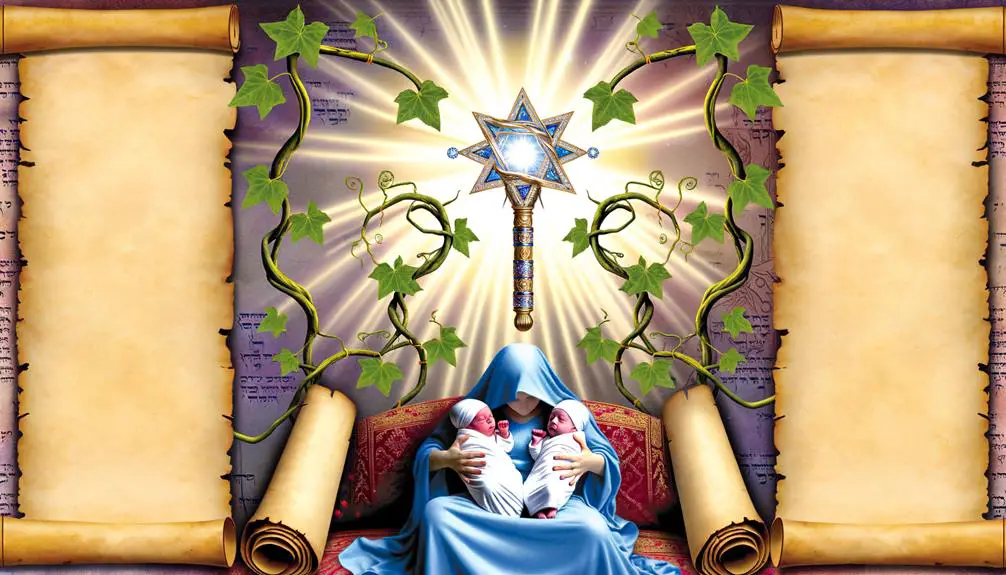
The lineage of Perez and Zerah significantly influences the biblical narrative, revealing intricate connections between divine providence and human genealogy. As you delve into the genealogical significance of these figures, you'll uncover the profound lineage implications that underscore much of the biblical story. Their lineage not only illustrates the complexity of human relationships but also highlights the meticulous care with which divine plans unfold through generations.
Perez, in particular, stands out due to his direct lineage to King David and, ultimately, to Jesus Christ. This lineage implications aren't merely historical footnotes; they represent the foundational threads through which God's promises to Abraham are fulfilled. The genealogy of Perez serves as a testament to the fulfillment of divine covenants across ages, bridging the gap between ancient promises and their ultimate realization in the coming of the Messiah.
To understand the depth of their impact, consider the following points:
- The Continuation of the Line: Perez's line directly leads to significant biblical figures, including King David and Jesus, emphasizing the role of divine providence in the sustenance and direction of this lineage.
- The Symbol of Divine Grace: The circumstances surrounding Perez and Zerah's birth symbolize the unexpected ways in which God's grace operates, often overturning human expectations to fulfill divine purposes.
- The Conduit for Messianic Fulfillment: Through Perez, the lineage becomes a conduit for the messianic prophecies foretold throughout the Old Testament, culminating in the birth of Jesus.
In analyzing the genealogical significance and lineage implications of Perez and Zerah, you're invited into a contemplation of the divine orchestration evident throughout biblical history, where every detail serves a purpose in the grand narrative of redemption and grace.
Frequently Asked Questions
How Do Perez and Zerah's Stories Influence Modern Interpretations of Jewish and Christian Ethics?
When you delve into how ethical paradigms and leadership models shape modern interpretations of ethics in Jewish and Christian contexts, it's essential to consider foundational stories.
These narratives provide rich soil from which contemporary ethical discussions grow. They influence how principles are applied today, guiding actions and decisions within these faith communities.
Analyzing these stories helps you understand the complexities of moral leadership and its impact on today's ethical standards.
In What Ways Have Perez and Zerah Been Represented in Religious Art and Literature Throughout History?
Throughout history, these figures have been immortalized in a whirlwind of cultural symbols and artistic influence that spans continents.
You'll find their stories woven into the fabric of religious art and literature, serving not just as subjects but as profound symbols of faith and moral complexity.
Their representations offer a mirror to ancient values, reflecting how deeply these narratives are rooted in the collective consciousness of both Jewish and Christian traditions.
What Are the Archaeological Evidences or Historical Findings That Support the Existence of Perez and Zerah?
You're diving into a quest for historical and archaeological evidence to validate the existence of certain figures, igniting genealogical debates and unraveling their cultural impacts.
While concrete evidence might be sparse, the traces and artifacts you seek could offer insights into the eras they lived in.
Your investigation isn't just about proving they were real but understanding their roles in history's tapestry, honoring their legacy in a scholarly and reverent manner.
How Do the Names Perez and Zerah Reflect Their Characters and Destinies According to Biblical Onomatology?
In biblical onomatology, naming carries deep significance, reflecting character and destiny. For you, understanding the twin symbolism in Perez and Zerah's names unveils their narratives.
Perez, meaning 'breach,' symbolizes a breakthrough, foretelling his role in continuing Judah's lineage. Zerah, meaning 'dawn' or 'brightness,' hints at hope and new beginnings.
These names, steeped in rich symbolism, offer you a window into their destinies and the profound theological themes they embody.
What Are the Differences in the Rabbinic and Christian Interpretations of the Significance of Perez and Zerah's Birth Story?
You're exploring how interpretations diverge on the birth story's significance, focusing on its genealogical importance and birthright narratives. Rabbinic views often emphasize moral lessons and divine providence, seeing deeper meanings in the struggle and outcome.
Christian interpretations might highlight typology and messianic foreshadowing, linking the story to broader salvation themes. Both perspectives offer rich, layered understandings but approach the tale's implications with distinct theological lenses, reflecting their unique traditions and teachings.
Conclusion
In the tapestry of biblical narratives, the story of Perez and Zerah stands as a vivid thread, highlighting the complex interplay of human choice and divine will.
Your journey through Tamar's courageous act, the twins' tumultuous birth, and their respective legacies reveals the profound impact of these figures on the lineage of biblical history.
Like a river that splits but eventually rejoins, their story flows into the broader narrative, enriching our understanding of faith, prophecy, and redemption.

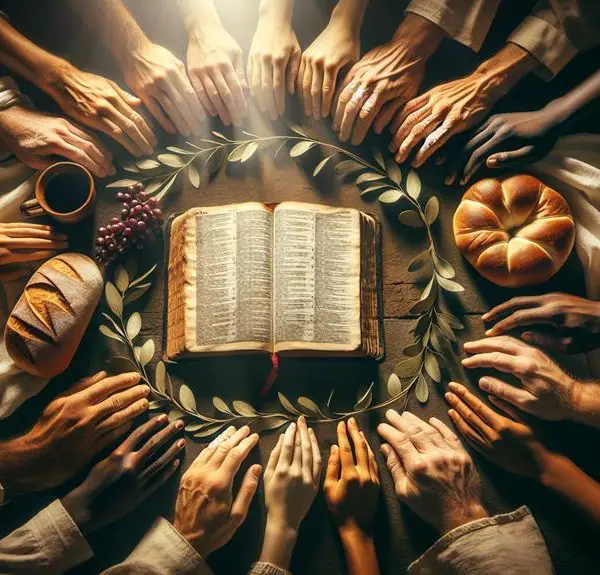
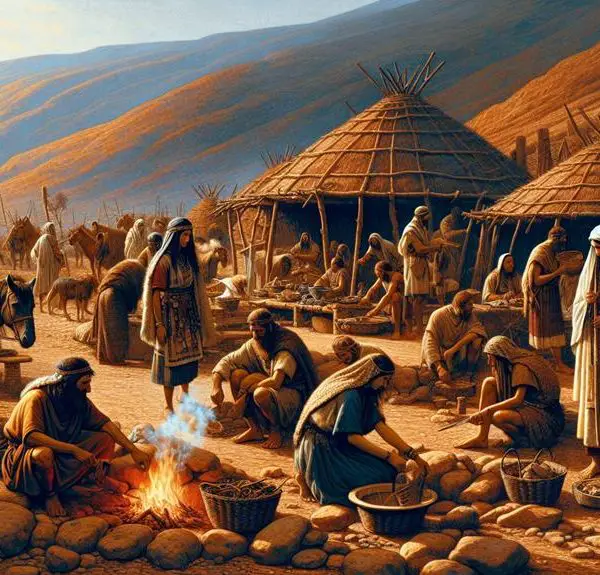
Sign up